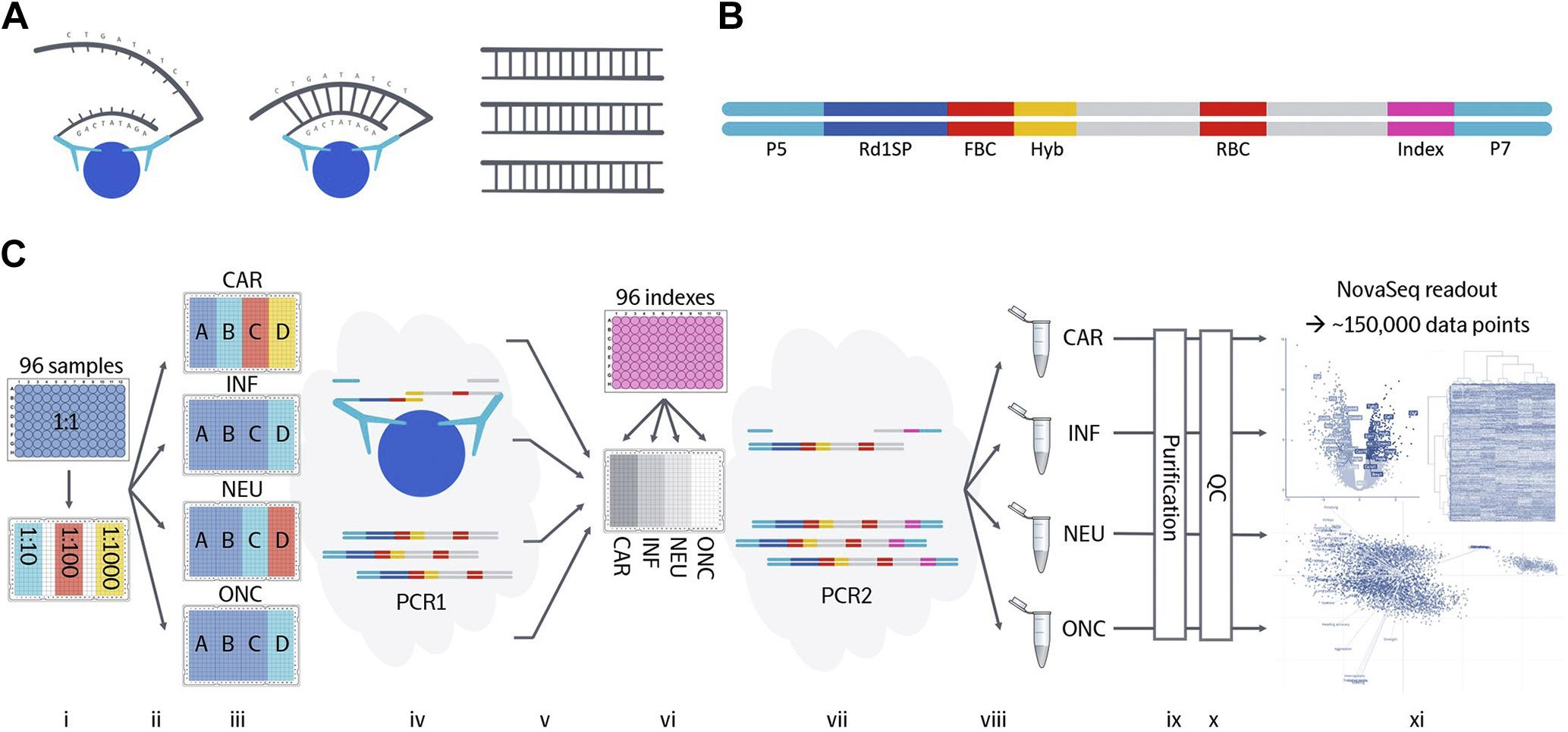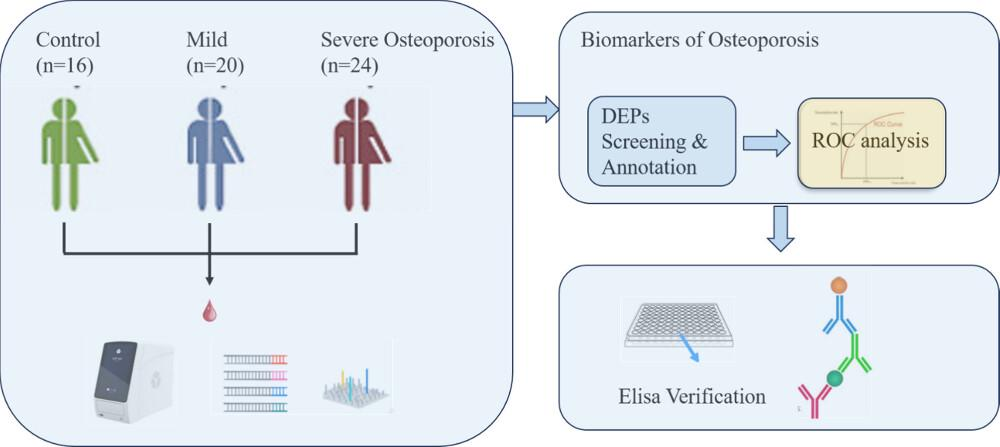Olink Proteomics Analysis Services
Proteomics, as a crucial branch of life sciences, plays a significant role in elucidating protein expression, modifications, and interactions within biological systems. Olink proteomics technology is based on the Proximity Extension Assay (PEA) principle. This technique employs dual-specificity antibody probes to detect target proteins. Each probe consists of two components: one part is a specific antibody targeting the protein of interest, while the other part is an oligonucleotide tag. When both probes bind to distinct epitopes on the target protein, their oligonucleotide tags come into close proximity, enabling ligation by a DNA ligase. The ligated oligonucleotides can then be amplified by PCR and subsequently quantified. Due to its high sensitivity and high-throughput capabilities, Olink proteomics analysis services are widely applied in clinical diagnostics, drug development, and related research fields.

Wik, L. et al. Mol Cell Proteomics, 2021.
Figure 1. Schematic Overview of Olink Explore.
Services at MtoZ Biolabs
Utilizing Olink Explore 384/1536/3072, Olink Target 96, Olink Target 48, and Olink Flex protein detection platforms, MtoZ Biolabs offers Olink proteomics analysis services that enable high-throughput, highly specific, and highly sensitive protein analysis.
Service Advantages
1. Advanced Analytical Instruments
MtoZ Biolabs employs state-of-the-art instrumentation from Olink, establishing a robust Olink proteomics analysis services platform capable of delivering highly sensitive and high-resolution protein analysis.
2. Transparent Pricing
Our pricing is transparent, with no hidden or additional fees.
3. High Data Quality
The Olink PEA technology employs precisely matched DNA-encoded antibody pairs and signal amplification, enabling the detection of proteins at concentrations as low as fg/mL in just 1 μL of plasma/serum. This breakthrough surpasses the detection limits of traditional methods, making it especially suitable for rare sample analysis and biomarker discovery.
4. Multiplex Detection with Minimal Sample Consumption
MtoZ Biolabs’ Olink proteomics analysis services enable the simultaneous quantification of 92–3072 proteins (depending on the selected panel), significantly reducing batch effects. Additionally, only 1–3 μL of sample is required for multi-omics correlation analysis, greatly enhancing research efficiency.
5. Comprehensive Panel Designs for Diverse Research Needs
(1) Olink Target Series: Focuses on 11 disease areas, including cardiovascular, immuno-oncology, and neuroscience, offering predefined biomarker panels.
(2) Olink Explore Series: Provides unbiased profiling of 1473–3072 proteins, making it ideal for biomarker discovery and mechanistic studies.

6. Customized Services
Tailored analysis solutions are provided based on customer requirements.
Applications
1. Disease Research and Biomarker Discovery
Olink proteomics analysis services enable the identification of proteins associated with disease onset, progression, and prognosis. This facilitates the discovery of potential biomarkers, supporting early diagnosis and personalized treatment strategies.
2. Clinical Research
By analyzing protein expression in patient samples, Olink technology helps uncover disease mechanisms, assess treatment responses, and accelerate the development of novel therapeutics.
3. Immunology and Oncology Research
Olink proteomics analysis services are widely applied in immunology research, including immune responses and the tumor immune microenvironment. It helps researchers understand the interactions between the immune system and diseases.
4. Metabolic and Neurological Disorders
By detecting proteins associated with metabolic processes and neurodegenerative diseases, Olink technology contributes to studying the molecular mechanisms of these conditions.
5. Drug Development and Clinical Trials
Olink proteomics analysis enables tracking of drug targets and biomarkers during drug development. It aids in evaluating drug efficacy and safety, accelerating the clinical trial process.
Case Study
1. Olink Proteomics Analysis for Identifying Differential Serum Proteins Associated with Postmenopausal Osteoporosis (PMOP)
This study utilized Olink proteomics analysis to identify differential serum proteins associated with postmenopausal osteoporosis (PMOP) and determine prognostic biomarkers for early PMOP detection through molecular mechanism research. Participants were randomly divided into three groups based on dual-energy X-ray absorptiometry (DXA) T-scores: osteoporosis group (n = 24), osteopenia group (n = 20), and normal bone mass group (n = 16). Serum samples were collected from all participants for clinical and bone metabolism biomarker measurements. Olink proteomics analysis services were applied to identify differentially expressed proteins (DEPs) highly correlated with PMOP. Functional analysis of DEPs was conducted using Gene Ontology and KEGG pathway enrichment. Subsequently, the biological properties of these proteins and their correlation with PMOP were assessed. ROC curve analysis was performed to determine the most accurate early biomarkers for PMOP diagnosis. Through Olink proteomics analysis, five DEPs highly associated with PMOP were identified, including two upregulated and three downregulated proteins. Among them, TWEAK and CDCP1 were identified as potential early predictive biomarkers for postmenopausal osteoporosis.

Li, C Y. et al. Journal of Proteome Research, 2024.
Figure 2. Olink Proteomics Analysis of Serum Proteins Associated with PMOP.
MtoZ Biolabs is a comprehensive chromatography and mass spectrometry (MS) service provider, continuously expanding its expertise in proteomics. Equipped with Thermo’s state-of-the-art Orbitrap Astral high-resolution mass spectrometer and Bruker’s timsTOF HT system, MtoZ Biolabs also integrates automated sample preparation systems for proteins and metabolites. The company offers high-throughput, rapid turnaround proteomics analysis for routine protein studies, robust single-cell and spatial proteomics investigations, and qualitative detection of trace and specialized sample proteomes. Additionally, with MALDI-TOF technology, MtoZ Biolabs enables both routine and customized spatial metabolomics analysis. In recent years, MtoZ Biolabs has focused on the development and application of single-cell spatial multi-omics technologies based on biological mass spectrometry. The company is committed to establishing an integrated, standardized, professional, and scalable analytical platform, driving innovation in proteomics and multi-omics research.
How to order?







